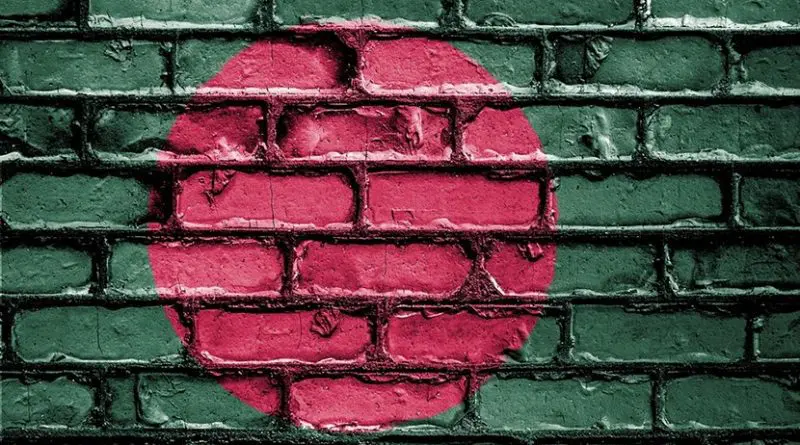Call For Bangladesh To Investigate Dismissals Of Protesting Workers
Bangladesh authorities should immediately investigate garment worker and union leader allegations of arbitrary dismissals and false criminal cases following a recent protest demanding a wage hike, Human Rights Watch said. Global garment brands sourcing from Bangladesh should investigate these allegations and call for an end to all forms of intimidation of workers.
After strikes in mid-January 2019, union leaders have reported at least 7,500 garment workers were dismissed from their jobs. Some of those dismissed were accused of vandalism and looting, but the allegations appeared broad and vague. At least 29 criminal cases have been filed naming 551 individuals, as well as over 3,000 unidentified people, leaving workers at risk of being arbitrarily accused in one of these cases at a later date. Over 50 workers have been arrested, 11 of whom were denied bail.
“Bangladesh has made international pledges to ensure worker safety and protect their rights, but is falling short of its commitments when workers strike to demand a livable wage,” said Phil Robertson, deputy Asia director at Human Rights Watch. “Factories in Bangladesh should not use false criminal complaints and mass terminations to stifle workers’ collective action.”
Over 50,000 garment workers in Dhaka, Ashulia, Narayanganj, Savar, and Gazipur districts participated in wildcat strikes in mid-December and again in mid-January, protesting wage changes that went into effect December 1, 2018. In December, union leaders said that government officials had threatened them in public and private settings that they would be arrested or disappeared if the protests continued ahead of the December 30 general elections. When protests were organized again in January, Bangladesh police used water cannons, tear gas, and rubber bullets against them, witnesses told Human Rights Watch. One worker was killed and over 50 injured.
Human Rights Watch interviewed eight witnesses to the police violence, fourteen dismissed workers, and three union leaders, and also reviewed lists of fired workers and dismissal notices posted on the factories.
It’s grotesque to imagine police raiding homes and indiscriminately shooting rubber bullets, but that is exactly what Bangladesh authorities have resorted to.
Phil Robertson
Deputy Asia Director
On January 8, Sumon Mia, 22, was shot and killed during the protests by the police, said a witness whose name, like those of other people interviewed, has been withheld for his protection. A colleague of Mia’s told Human Rights Watch that he and Mia were returning from their lunch break when they got caught in the protests: “Police started shooting and the workers started running away, so Sumon and I started running and suddenly Sumon was shot in his chest and he fell down. I fled.… Later I found Sumon’s body lying in the road. The police didn’t even take his body.”
Also on January 8, police raided the Savar neighborhood outside Dhaka where many workers live, seeking people who had participated in the protests. A bystander said she was shot as she stood at her darkened window on the second floor of her building. She told Human Rights Watch: “The police were raiding house to house and when they were heading toward our house, I heard them firing. I heard six rounds of firing. Two hit my glass window and one went through, hitting my lower abdomen.… They were just shooting randomly.”
H&M released a statement on February 7 calling for “respectful negotiation and peaceful dispute resolution,” and regular revision of the minimum wage level in Bangladesh. H&M also signed a Memorandum of Understanding with factory management, associated trade unions, and worker representatives to ensure that “documents and agreements that have now been signed are acknowledged and approved by all parties, outlining valid information, and appropriate grounds for termination of employment” for the workers who were dismissed from the three factories that produce for H&M.
The use of criminal complaints against large numbers of “unknown” people is a common abusive practice in Bangladesh, allowing the police to intimidate and threaten virtually anyone with arrest, repeatedly re-arrest detainees even though they are not the named accused in the cases, and thwart bail. Union leaders told Human Rights Watch that many workers were in hiding out of fear of arbitrary arrest under these unnamed cases. Human Rights Watch has documented previous use of this technique. That union leaders and workers are in hiding demonstrates the chilling effect such a practice has on freedom of association and other basic rights.
Brands sourcing from Bangladesh like H&M, KiK, Tchibo, Lidl, Mango, Next, Matalan, VF, Takko, ALDI, Marks & Spencer, Esprit, Walmart, JCPenny, and Tesco have the responsibility to respect and protect workers’ rights. They should call for an end to dismissals based on the exercise of basic rights and other forms of intimidation.
“It’s grotesque to imagine police raiding homes and indiscriminately shooting rubber bullets into the workers’ neighborhood, but that is exactly what Bangladesh authorities have resorted to,” Robertson said. “The Bangladesh government should instead demonstrate to the international community – and the customers of its US$36 billion garment industry – that it is serious about committing to workers’ rights and safety.”

